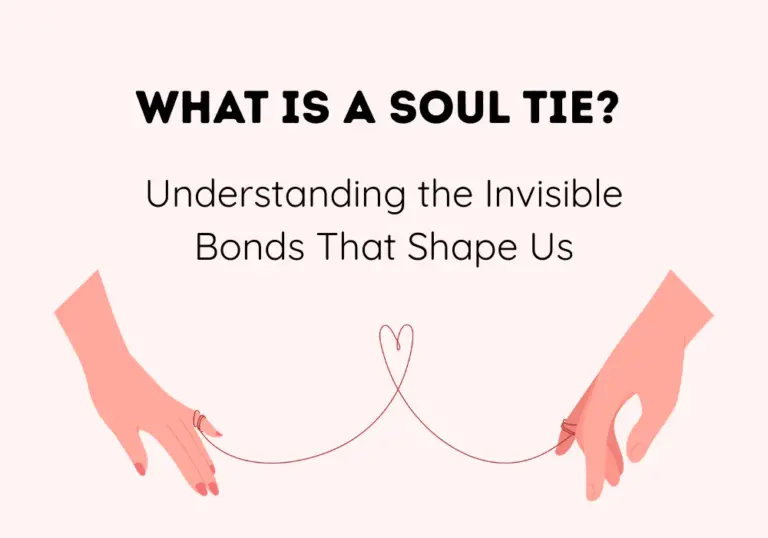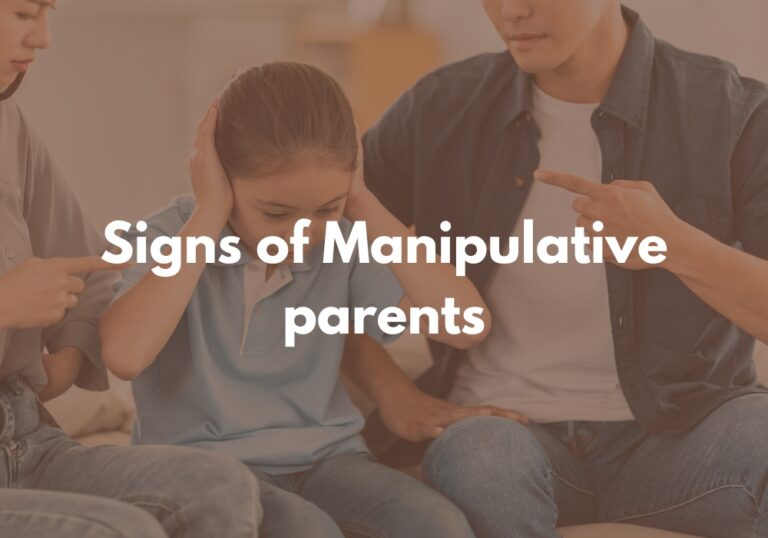Being in a relationship with a narcissist doesn’t always look toxic at first. It often begins with charm, emotional intensity, and a strong sense of connection that feels meaningful and real.
Over time, however, you may start to feel constantly judged, emotionally drained, or anxious about saying or doing the wrong thing. You might find yourself walking on eggshells, protecting your partner’s fragile self-esteem, while slowly losing confidence in your own thoughts and feelings.
These experiences are not just normal relationship problems. They are common signs of a narcissistic relationship, driven by patterns of control, lack of empathy, and emotional manipulation.
In this guide, you’ll learn the 15 most common signs you’re in a relationship with a narcissist, explained clearly so you can recognize what’s happening, understand why it feels so confusing, and begin regaining clarity and control.
What Is Narcissistic Personality Disorder?
Narcissistic Personality Disorder (NPD) is a mental health condition that affects around 1–2% of people. It’s defined by a persistent pattern of self-importance, a strong need for admiration, and a noticeable lack of empathy. While many more individuals may display narcissistic traits without meeting the full diagnostic criteria.
NPD usually begins in the teenage years or early adulthood and can stem from a mix of factors like genetics, brain structure, childhood experiences (such as extreme criticism or over-pampering), and even cultural values that glorify self-promotion.
In close relationships, people with NPD often create emotionally harmful patterns—starting with charm and idealization, followed by criticism, and eventually emotional withdrawal or abandonment. This cycle can be confusing and hurtful for their partners.
Only a mental health professional can give a proper diagnosis, but recognizing the signs can help you better understand the dynamics at play and take steps to protect your emotional health.
Related: Source
Related: 23 Signs of Repressed Childhood Trauma in Adults
Signs You Are In a Relationship with a Narcissist: 15 Red Flags
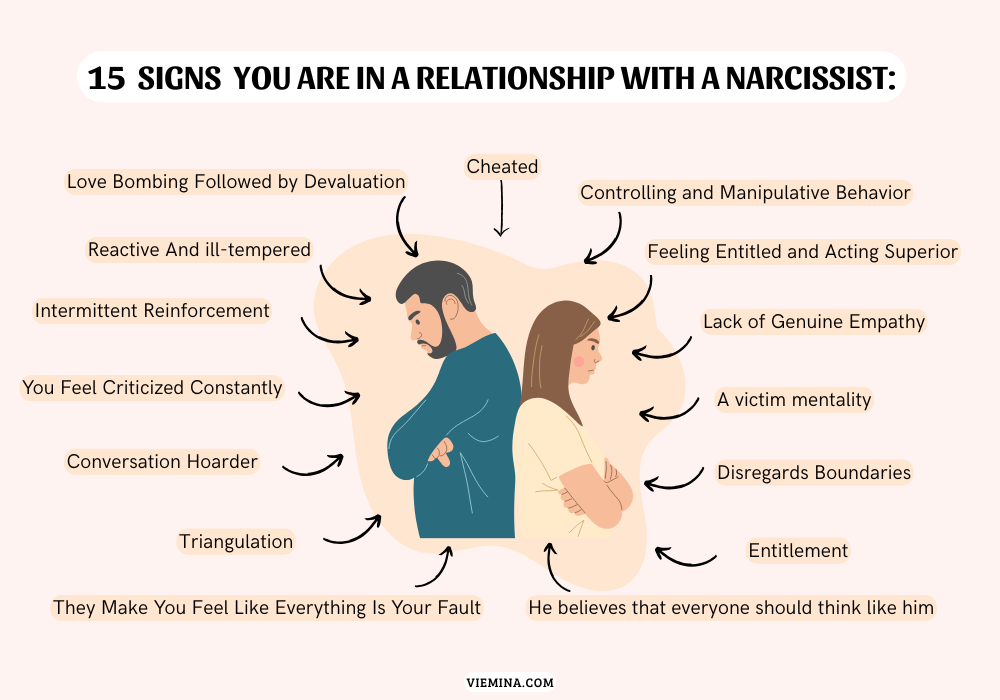
Learning to recognize the signs of narcissism can help you protect yourself from emotional manipulation. If you’re wondering whether you’re involved with a narcissist, consider these 15 warning signs:
1-Love Bombing Followed by Devaluation:
The relationship likely started with intense romance, excessive compliments, and promises of a perfect future together. This “love bombing” phase makes you feel like you’ve found your soulmate. However, once they feel secure in your attachment, the dynamic shifts dramatically.
Your partner begins criticizing you, pointing out flaws, or comparing you unfavorably to others. This creates confusion and makes you long for the return of their initial adoration.
Related:7 Stages of Trauma Bonding: Effects, Causes & How to Heal
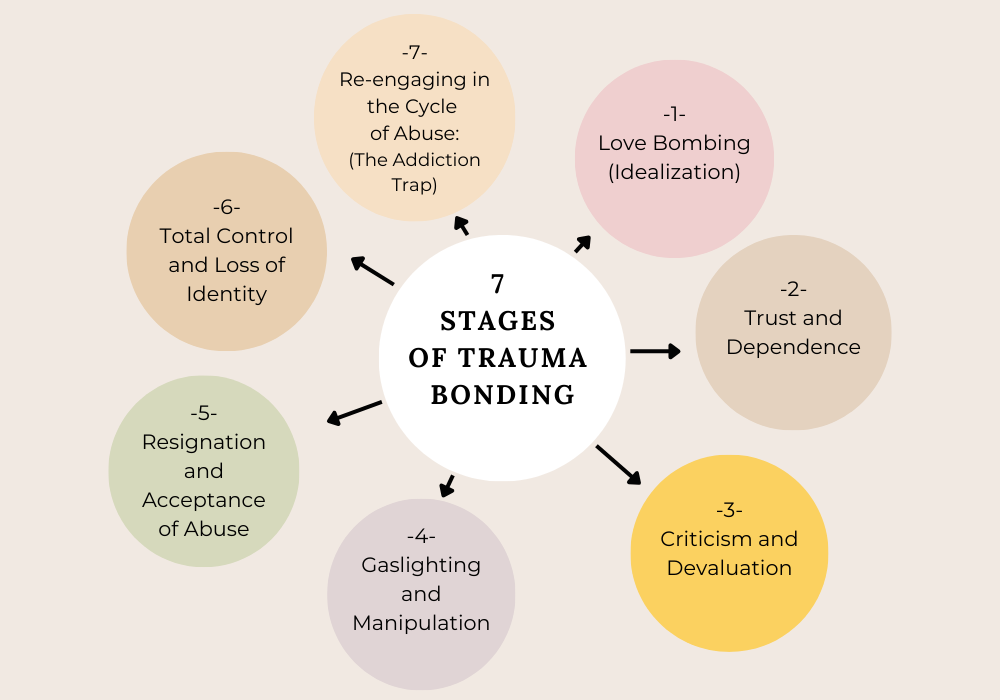
2-Conversation Hoarder:
Narcissists love to dominate conversations, leaving little room for you to share your thoughts or feelings. If you do manage to speak up, your views may be corrected, dismissed, or completely ignored—especially if they don’t match the narcissist’s opinions. It can feel like your voice doesn’t matter at all.
3-Lack of Genuine Empathy:
One of the most painful signs of narcissism is their unwillingness or inability to recognize or identify with your feelings and needs. When you’re upset, they might become impatient, dismissive, or even angry rather than supportive.
- Dismiss your emotions as overreactions.
- Make the situation about themselves.
- Show irritation when you need comfort.
- Fail to offer meaningful consolation during difficult times.
4-A victim mentality:
Narcissists are extremely self-centered, which often leads them to play the victim. In a relationship with a narcissist, any disagreement or fight will somehow become your fault. They may twist things around to make you feel guilty, and if you don’t agree with them, they might accuse you of being negative. This behavior can make it hard to have healthy or fair conversations.
Related:Victim Mentality: Signs, Causes, and 12 Strategies
5-Disregards Boundaries:
They consistently ignore, challenge, or violate your personal boundaries, whether physical, emotional, or financial. Your “no” is seen as a challenge rather than a limit to be respected.
Related: 7 Tips for Saying No Effectively
6-Controlling and Manipulative Behavior:
When you’re in a relationship with a narcissist, control doesn’t always come in obvious ways. Instead, it often shows up through subtle manipulation that leaves you feeling confused, drained, or like you’re always walking on eggshells.
Over time, you might start giving in just to avoid conflict. Before you realize it, you barely recognize the person you were before.
Here are some ways narcissists try to control their partners:
- Gaslighting:
This involves making you question your own memories, emotions, or sense of reality. You might start doubting if things happened the way you recall.
- Isolation:
They may try to pull you away from your friends or family leaving you feeling alone, and more reliant on them.
- Managing Finances:
They take charge of your money or restrict your resources to make you rely on them for financial support.
- Keeping Tabs:
They watch your messages, social media, or location often under the excuse of “just caring”.
- Subtle Threats or Pressure:
They use guilt trips, ignore you , or pull away to get you to do what they want —without directly asking.
Related:Signs of a Manipulative Friend: 20 Red Flags to Spot
Related:How to Deal With Manipulative People
Related:20 Warning Signs of a Controlling Relationship
7-He believes that everyone should think like him:
A narcissist believes that their opinion is the only one that matters and that everyone should think the same way as them. Their belief that they have all the answers and that everyone else is wrong—can often lead to delusional thinking and behavior.
This is why they’re so stubborn, can’t see things from other people’s perspectives, and are strong-willed. Their mindset is so inflexible that they cannot put themselves in someone else’s shoes or view situations from various angles to better comprehend others’ thought processes.
8-Entitlement:
Narcissists often believe they deserve special treatment and expect others to cater to their needs without offering consideration in return. They see the world as revolving around them, prioritizing their desires above all else.
9-Intermittent Reinforcement:
They alternate between punishment and reward unpredictably. This creates a trauma bond where you become addicted to the rare moments of kindness and validation, similar to gambling addiction psychology.
10-Reactive And ill-tempered:
While they may seem extroverted, magnetic, and charming, their darker side can emerge when they get upset. They can become explosive and even turn into monsters when things don’t go their way. Their mood can shift suddenly and without warning, making the relationship feel unpredictable. Narcissists often react emotionally and impulsively, rather than staying calm and diplomatic, which can create tension and difficulty in the relationship. Partners may find themselves agreeing with the narcissist out of fear of appearing weak or provoking their anger.
11-Cheated:
A narcissist is highly charming and knows how to sweep people off their feet, making it easy for them to hide their true intentions. In a relationship with a narcissist, they might cheat on you and skillfully conceal their actions. If they’ve cheated before, there’s often little to stop them from doing it again, as they prioritize their own desires over loyalty or the feelings of others.
12-You Feel Criticized Constantly:
In a relationship with a narcissist, your partner may frequently criticize your appearance, such as your weight or the clothes you wear, often being excessively critical. This could include making fun of you, either in private or in front of others. Narcissists tend to belittle those they perceive as inferior, often targeting individuals they view as less attractive or wealthy. This behavior is a reflection of their need to feel superior to others and maintain control in the relationship.
13-Feeling Entitled and Acting Superior:
People with narcissism often believe they are more significant than others. This belief shapes how they interact with those around them. Their sense of entitlement appears in day-to-day interactions and relationships in ways that may come across as unfair or disrespectful and can even feel degrading.
Here are some usual signs of entitlement and a superiority complex in narcissistic behavior:
- They Think They Deserve More:
Narcissists often feel they should get extra attention, compliments, or privileges. They can become annoyed or angry when they don’t get what they feel they deserve.
- Rules Aren’t Meant for Them:
They act like rules or social expectations don’t apply to them. Like waiting in line, following procedures, or being told “no” can trigger irritation or outrage.
- Their Wants Come First:
Their wants always come first, and they rarely consider how their actions impact others. They expect others to adjust and cater to them—without offering the same in return.
- They Stick to “Special” Company:
A narcissistic partner might think they can bond with people or groups they see as important or high-ranking. They could look down on or insult those they consider “ordinary” or not equal to them.
Their exaggerated self-image often leads to an ongoing lack of balance in relationships making it easy for your needs to be ignored or dismissed.
14-Triangulation:
They may bring third parties into your relationship conflicts, either by comparing you to others, involving family members in disputes, or creating competition between you and their friends, ex-partners, or colleagues.
15-They Make You Feel Like Everything Is Your Fault:
One of the most common signs you are in a relationship with a narcissist is the constant feeling that everything is your fault. Narcissists rarely take responsibility for their actions. Instead, they twist situations to blame others—especially their partners. You might find yourself apologizing for things you didn’t do or constantly trying to fix problems you didn’t create. Admitting fault doesn’t align with their inflated self-image, so they avoid apologies at all costs. Over time, you may start to question your own judgment, feel emotionally drained, and wonder why nothing ever seems to be enough. This toxic pattern is not just frustrating—it’s emotionally damaging, and a clear indicator of narcissistic behavior in a relationship.
Related:Manipulative Apology Examples: Spot Fake Apologies Easily
The Cycle of Narcissistic Abuse:
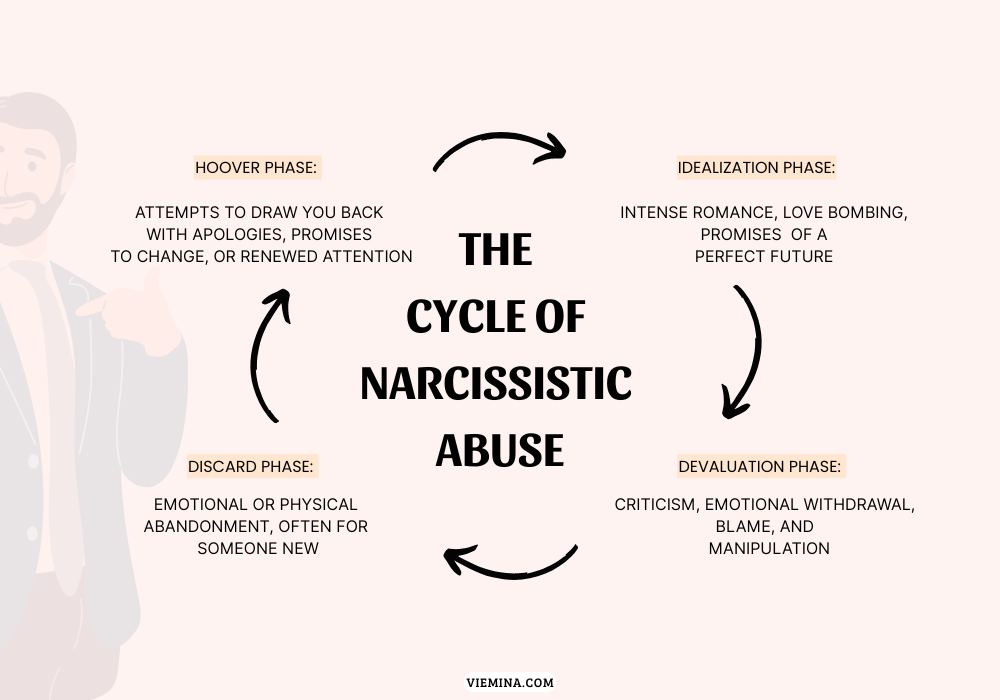
Understanding the typical pattern can help you recognize where you are in the cycle:
1-Idealization (Love Bombing):
The relationship begins with excessive flattery, attention, and affection. The narcissist puts you on a pedestal, making you feel special and uniquely understood. They might shower you with gifts, compliments, and declarations of love that seem too good to be true—because they are.
“When you first met, he texted constantly, planned elaborate dates, and told you that you were his soulmate within weeks. You were swept off your feet, not realizing this intensity was actually a red flag.”
This phase creates an intense emotional bond and establishes a high standard that you’ll later strive to return to.
2-Devaluation:
Once the narcissist feels secure in your attachment, the devaluation begins. Compliments are replaced with criticisms. Your flaws become the focus. What they once loved about you becomes annoying or inadequate. This shift may be subtle at first but becomes increasingly obvious and painful.
During this phase, you might find yourself working harder to please them, thinking if you could just be “better,” you could recapture that initial golden period.
3-Discard:
Eventually, the narcissist may discard you emotionally or physically. They might break up, have an affair, or simply withdraw all affection and attention. This isn’t necessarily the end of the relationship but it’s a big change that leaves you feeling lost and unsure.
The discard phase often coincides with the narcissist’s interest in a new source of narcissistic supply—someone who will provide the admiration and validation they crave.
4-Hoovering:
Just when you start to recover, the narcissist may return with renewed interest and affection. Like a vacuum (or “Hoover”) they try to suck you back into the relationship with apologies, promises, and a return to the loving behavior of the idealization phase.
This creates hope that the relationship can return to its early glory, restarting the cycle and deepening the trauma bond.
How to deal with narcissists in a relationship?
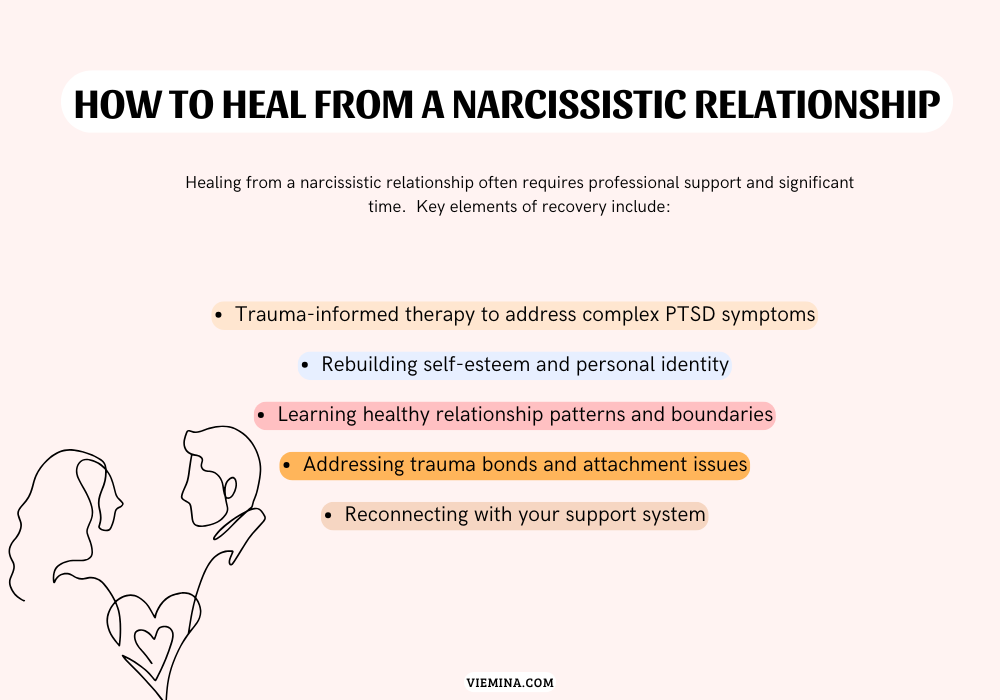
1-Set Boundaries with Narcissists:
- Be upfront and straightforward:
Share your boundary by keeping it simple and to the point. There’s no need to make long excuses or apologize for how you feel. For example, instead of saying: “I’m sorry, but I get upset when you criticize me in front of your friends, so maybe if it’s not too much trouble, could you try not to do that?” say: “I won’t stick around in conversations where I’m being criticized in front of others. If it happens, I’ll leave.”
- Stick to “I” statements:
Set boundaries by explaining your actions rather than controlling what others do. Rather than saying: “You need to stop calling me names when you’re angry.” Say: “I will step away from conversations when name-calling happens.”
- Stay consistent:
Always enforce your boundaries when they are crossed. If you are inconsistent, the narcissist will believe your limits can be bent.
- Brace yourself for resistance:
Be ready to face guilt-trips, anger, or arguments when you hold your ground with boundaries. That doesn’t mean your limits are wrong—it often shows they are needed.
- Don’t JADE (Justify, Argue, Defend Explain):
There’s no need to explain your boundaries to someone who won’t respect them in the first place.
2-Focus on Taking Care of Yourself and Building Confidence:
To cope with a narcissistic relationship, it’s important to protect your mental health and self-worth:
- Write in a personal journal to stay grounded and keep track of your reality.
- Speak to yourself and focus on self-compassion.
- Dedicate moments in your day to unwind and manage stress.
- Understand that a narcissist’s negative remarks are a reflection of their problems, not a measure of your value.
3-The Gray Rock Technique:
Sometimes, dealing with a narcissist feels exhausting—or even unsafe. That’s where the **gray rock technique** can help. It’s all about becoming as emotionally uninteresting as possible, so they lose interest and move on.
Instead of reacting or engaging, you keep things simple.
- You speak in a calm and flat tone.
- You do not share personal stories or show strong emotions.
- If they try to tease or provoke you, respond with short and neutral answers.
- You avoid giving opinions with which they can discuss and move away from the drama whenever possible.
The goal isn’t to change them—it’s to protect your peace by giving them nothing to push against.
Related: Grey rock method: What it is and how to use it effectively
4-Build Your Support Circle:
Narcissists often separate their partners from loved ones to maintain control. To handle a narcissist, realize you can’t change them—the way you react. Keeping ties with people who care about you is important.
- Stay in touch with your friends and loved ones.
- Think about joining a support group to connect with others dealing with narcissistic partners.
- Seek help from a therapist who knows how to handle cases involving narcissistic abuse.
- Find ways to socialize and build relationships outside of your partner.
Steps to Begin Healing from a Narcissistic Relationship:
Healing after being in a relationship with a narcissist takes patience and often needs expert help to build confidence again. If you’ve already left the relationship or are getting ready to leave, these steps can help you start recovering.
1. Focus on Your Safety:
If there’s a chance of being harmed or facing dangerous retaliation, pay attention to staying safe:
- Work on a safety plan with advice from a domestic violence expert.
- Keep important papers and money secure: like identification, financial records, and legal papers in a safe location.
- Look into restraining orders or other legal options if needed.
- Share your situation with trusted friends or family.
2. Give Yourself Time to Mourn:
Even bad relationships can make you feel a sense of loss, and it’s okay to feel sad about it:
- Accept that the relationship you imagined is gone.
- Allow yourself to feel hurt, angry, or let down.
- Understand that missing someone doesn’t mean going back is the right choice.
- Give yourself time since grief doesn’t move in a straight line.
Related: Exploring the 5 Stages of Grief Journey
3. Build Your Life and View of Yourself Again:
After going through manipulation and gaslighting learning to trust yourself matters:
- Remind yourself your feelings and experiences are real.
- Rediscover what you value, what you want, and your goals.
- Start making choices using your own judgment.
- Push back against harmful ideas about yourself that the narcissist planted.
4. Seek Help from a Skilled Mental Health Expert:
- Getting professional guidance can make the recovery process faster.
- Look for a therapist who knows how to help with recovering from narcissistic abuse
- Try therapies like EMDR to help with PTSD symptoms
- Join support groups to meet people who have been through similar experiences
- Read about trauma bonding to understand it and figure out how to break free
For those seeking structured guidance on this path, a specialized program like the Neuro-Thriving Resilience Program can provide essential tools and support from certified coaches.
-When Professional Help Is Necessary:
Consider seeking professional support if you experience:
- Persistent anxiety, depression, or trauma symptoms.
- Difficulty trusting your own perceptions.
- Social isolation or damaged relationships with friends and family.
- Suicidal thoughts or self-harm behaviors.
- Substance abuse as a coping mechanism.
-Professional Resources and Support:
- National Domestic Violence Hotline: 1-800-799-7233
- Psychology Today Therapist Directory for finding narcissistic abuse specialists
- Local domestic violence organizations for community-specific resources
5. Set Clear Boundaries To Stay Safe:
Take steps to avoid getting hurt again:
- Cut off or limit contact whenever you can (No Contact or Low Contact).
- Use clear and structured ways to communicate if you have to co-parent.
- Block the narcissist on social media and anywhere else they can reach you.
- Refuse to have talks about getting back together.
6. Find Yourself and What Makes You Happy:
Start learning who you are without the relationship:
- Get back into hobbies and passions you might’ve left behind.
- Mend bonds with your family and friends.
- Try out different interests and set new personal goals.
- Appreciate small successes during your recovery.
Keep in mind that healing doesn’t happen in a straight line. Setbacks will come, and that’s normal. Give yourself grace as you work through the challenges of recovering from this kind of relationship.
Related: 9 Types of Self Care Everyone Needs to Practice
Real-Life Examples: Celebrity Experiences with Narcissistic Partners:
Understanding how these patterns manifest in real relationships can help validate your experiences. Several public figures have shared their stories of narcissistic abuse:
Amber Rose’s Pattern Recognition:
Model Amber Rose, who dated several high-profile partners including Kanye West and Alexander Edwards, recognized her pattern of attracting narcissistic partners. She told Complex, “I had to go see a therapist, and she was just like, ‘You attract narcissistic sociopaths.’ And I am not mentioning any names. But a few of them have been like that.”
Rose described the classic manipulation tactics in an Instagram post: “When {you’re} in love with a narcissist, your brain tells you to run when your heart says stay. Unanswered questions. Gaslighting. Stonewalling, Deflecting, Projecting.” Her experience highlights how narcissistic abuse creates trauma bonds that make leaving difficult.
Sandra Bullock and Jesse James:
Actress Sandra Bullock’s marriage to Jesse James demonstrated how narcissists sabotage their partners’ success. James had an 11-month affair that began when Bullock started filming, and when asked about the affair, he confessed it was likely because of “ego, loneliness, distrust, which probably led to resentment.”
James’s resentment during one of Sandra’s most celebratory moments – winning an Oscar – shows how narcissists cannot tolerate when attention isn’t focused on them. Five other women came forward with cheating allegations, revealing a pattern of narcissistic behavior unrelated to any specific relationship. Even recently, his pregnant wife Bonnie accused him of cheating, calling him a “truly disgusting being” according to Daily Mail reports.
Related: 5 Famous Celebrities Who Dated Narcissists Share Their Experiences And Powerful Life Lessons
Conclusion:
Realizing you’re in a relationship with a narcissist can be one of the hardest parts of starting to heal. Pay attention to your gut feelings, write down what you go through, and don’t be afraid to get help from a professional. Keep in mind that narcissistic behavior does not change unless there is long-term focused therapy, and even then real change doesn’t happen much.
Your happiness,safety, and emotional health are important. You should have a relationship where respect, care, and clear communication exist. The recovery process might be tough, but with support and patience, you can regain your confidence, trust your views again, and build the loving and supportive relationships you deserve.
FAQ About Relationships with Narcissists:
-
How can I tell if I’m overreacting to normal relationship issues?
Victims of narcissistic abuse often doubt their own judgment. To evaluate this, look at the contrasts:
-In a healthy relationship, conflicts show:
Shared responsibility from both partners.
Sincere apologies when mistakes are made.
Respect for boundaries even while disagreeing.
Solutions to problems instead of the same issues repeating.-But in a relationship where narcissism is involved, you’ll notice:
Placing blame on one person.
Offering non-apologies like “I’m sorry you feel that way”.
crossing boundaries without acknowledging it.
The same conflicts happening over and over, never being resolved. -
Can narcissists love others?
Narcissists might say they feel love, but it often looks more like attachment or dependence. Their version of love usually:
Depends on getting admiration and obedience from their partner.
Shows little care for the unique needs or feelings of their partner.
Treats the partner as a part of themselves instead of an individual.
Fades when the partner stops meeting their narcissistic desires.
This stands apart from mature love, which involves understanding, valuing individuality, and caring about the other person’s happiness. -
Am I to blame for staying as long as I did?
Not at all. Narcissistic relationships form deep trauma bonds by alternating between rewards and punishments, a cycle called intermittent reinforcement. This kind of attachment works like an addiction and mirrors how drug dependency affects the brain making it very challenging to escape.
On top of that, gaslighting breaks down your trust in your own judgment leaving you unsure of yourself. -
Can narcissists change with therapy or love?
While some people with narcissistic traits can improve with intensive, long-term therapy, true change is rare and requires genuine self-awareness and commitment from the narcissist. You cannot love someone into changing, and attempting to do so often results in further harm to yourself.
-
Why do I keep attracting narcissistic partners?
This pattern often stems from childhood experiences, low self-esteem, or trauma bonding. People-pleasers, empaths, and those with abandonment issues may be particularly susceptible. Therapy can help identify and break these patterns.
-
Is it possible to co-parent successfully with a narcissistic ex?
Co-parenting with a narcissist is challenging but possible with strict boundaries, documentation, and sometimes legal intervention. Use parallel parenting strategies, communicate only about the children through written channels, and consider involving a family court mediator when necessary.
-
How long does it take to recover from narcissistic abuse?
Recovery time varies significantly based on the length and intensity of the abuse, your support system, and access to professional help. Many survivors report feeling significantly better after 6-12 months of focused healing work, though complete recovery may take several years.
-
What’s the difference between narcissistic abuse and regular relationship problems?
Narcissistic abuse involves systematic patterns of manipulation, control, and psychological harm. Regular relationship problems typically involve two people who care about each other working through conflicts with mutual respect and empathy. In narcissistic abuse, one person consistently dominates and harms the other.
-
Should I confront my partner about their narcissistic behavior?
Direct confrontation often backfires with narcissists, leading to rage, gaslighting, or increased manipulation. If you’re considering this approach, ensure you have a safety plan and support system in place. Focus on your own healing and establishing boundaries rather than trying to change them.
-
How do I explain narcissistic abuse to friends and family who don’t understand?
Share specific examples rather than general descriptions. Provide educational resources about narcissistic abuse. Remember that some people may not understand unless they’ve experienced it themselves. Seek support from those who validate your experiences.
-
Can medication help with narcissistic abuse recovery?
While there’s no medication specifically for narcissistic abuse recovery, treatment for resulting anxiety, depression, or PTSD can be beneficial. Consult with a healthcare provider who understands trauma to discuss options that might support your healing process.


